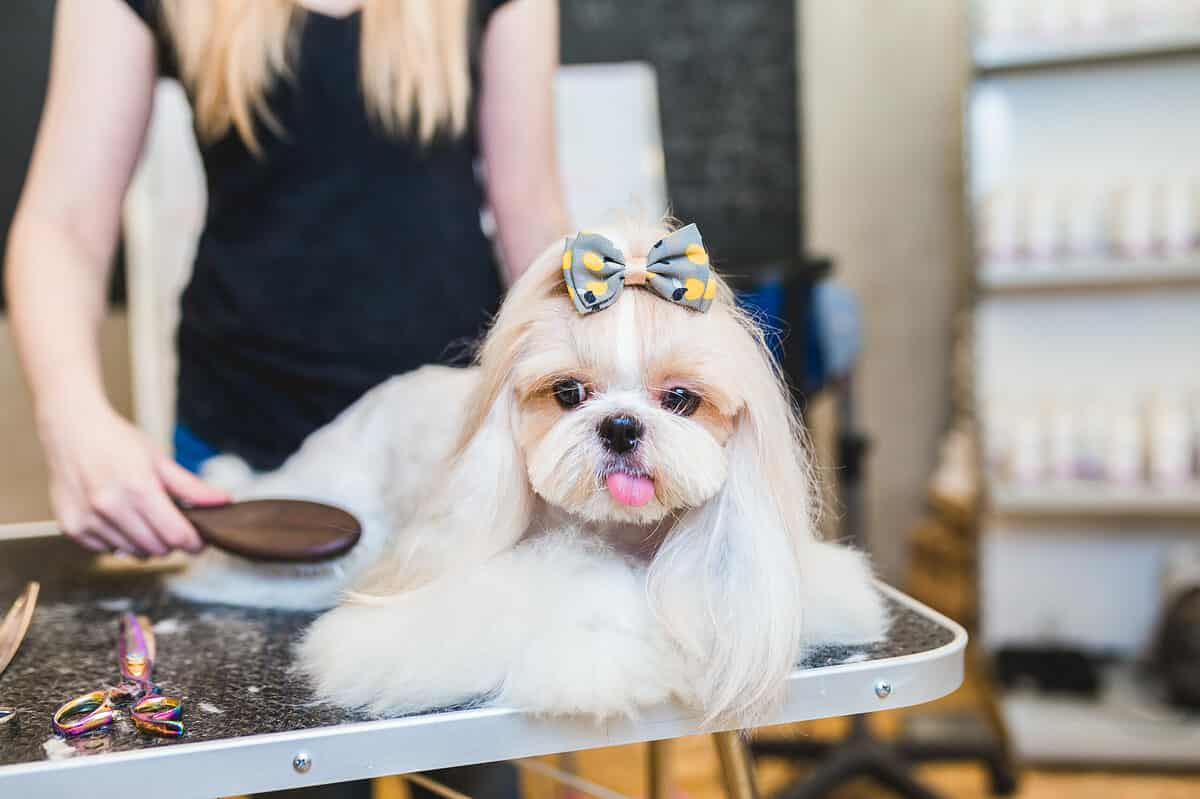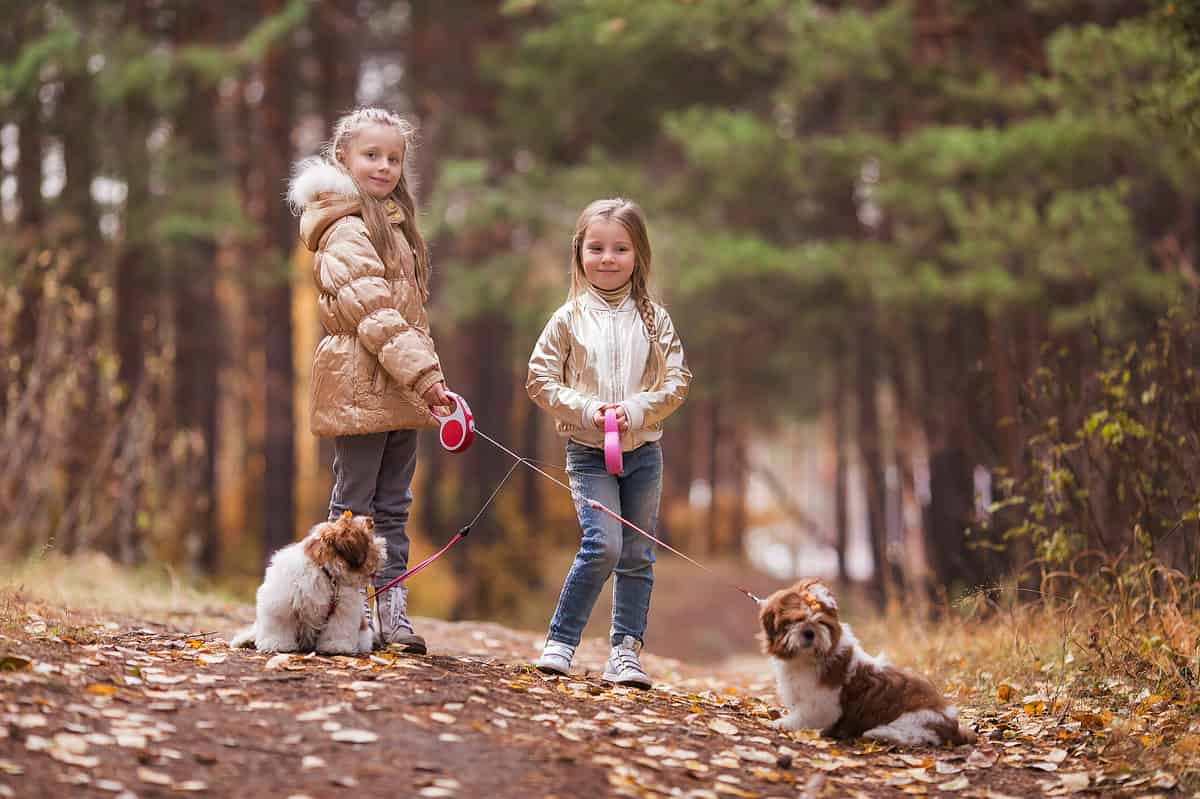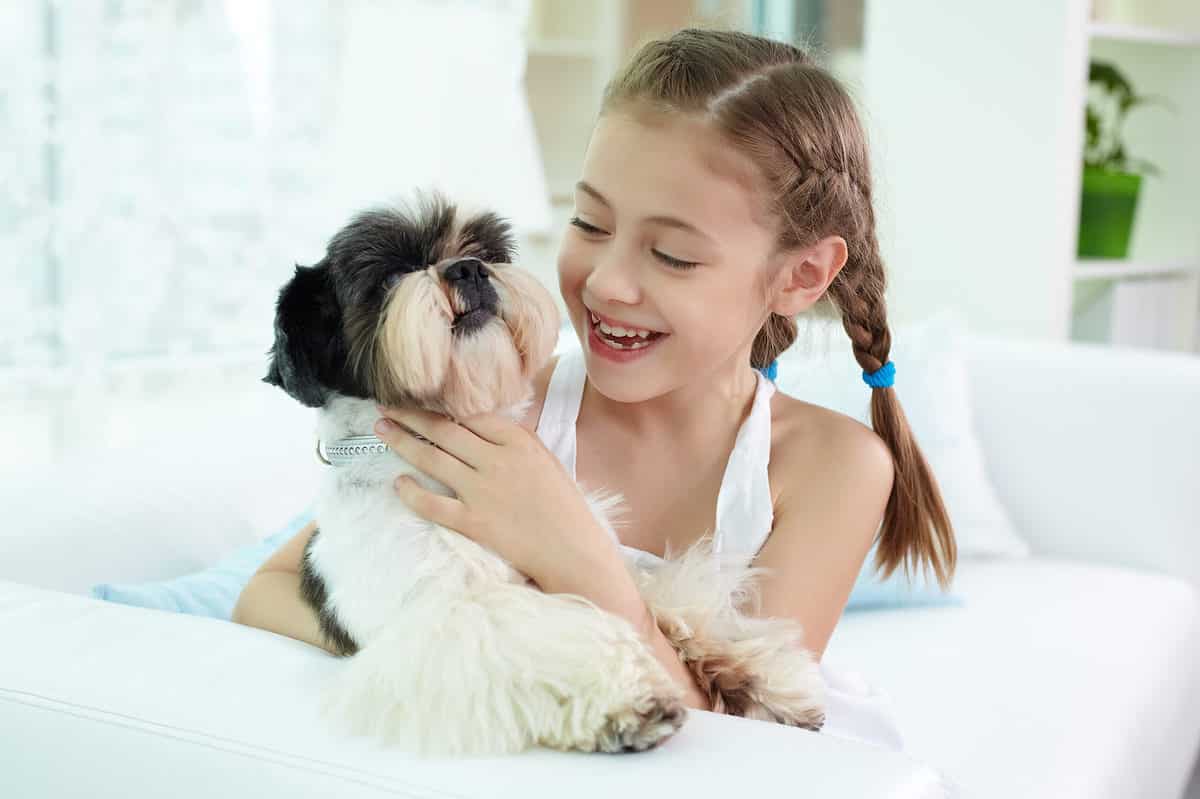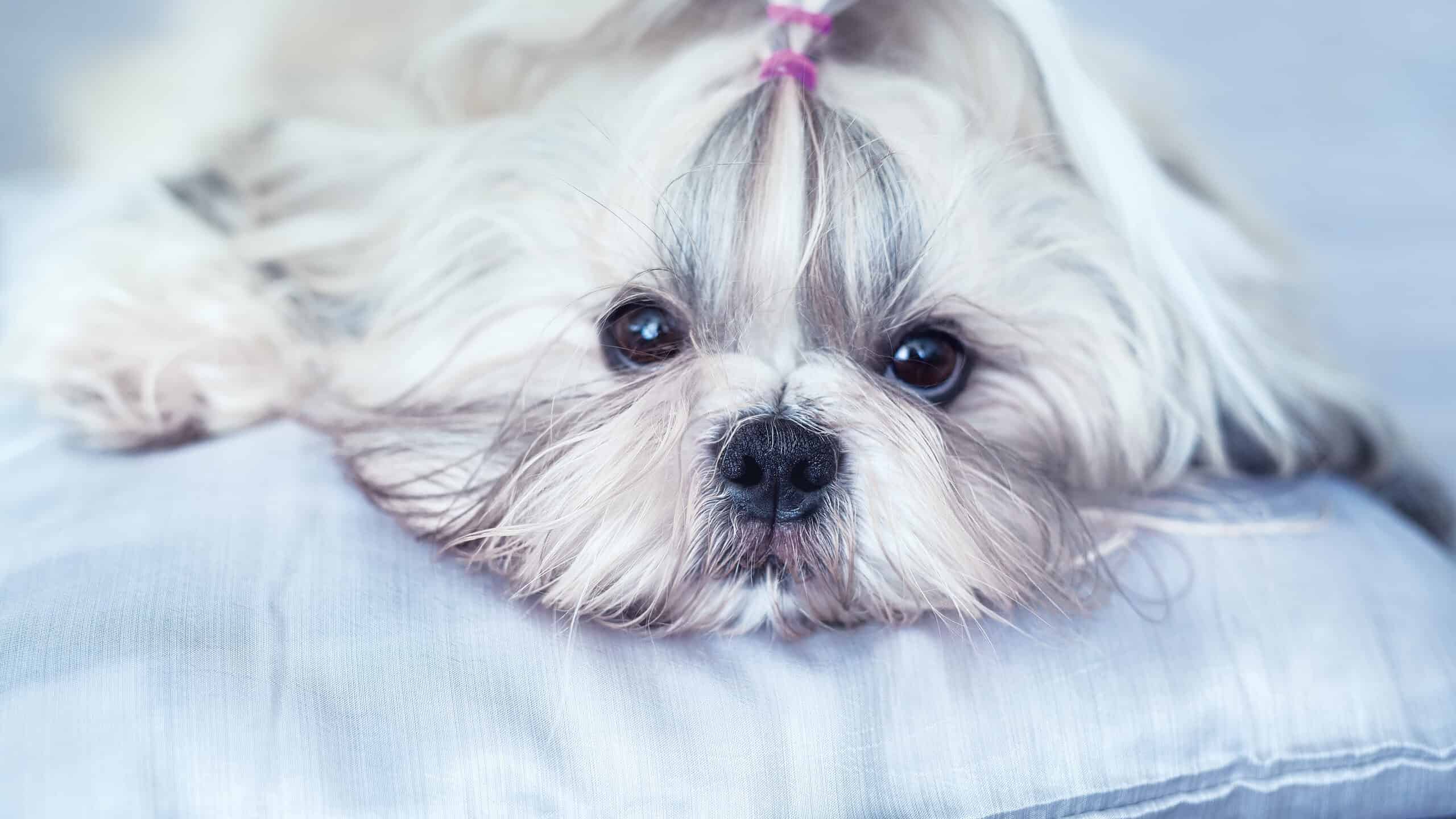Shih Tzus are recognizable by their large, adorable faces and long, gorgeous hair. Often, they may be dressed up with bows and cute hairstyles. A Shih Tzu's small size can make them irresistible to adults and children alike. Shih Tzus only grow to be around ten inches tall and up to 16 pounds! This breed is an affectionate lap dog who loves to be around people. Their small size and love for human companionship may have you asking as a parent, are Shih Tzus good with kids?
Shih Tzu Personality and Temperament
Shih Tzus can live up to an average of 15 years! Their life span makes wanting to adopt one as a family pet appealing to many parents. It may mean your kid can grow up with a childhood pal they will be able to cherish for many years.
Shih Tzus are homebodies who love to be companions of humans. They do not bark excessively, although they can still be a bit yappy! If you are searching for a guard dog, a Shih Tzu is most likely not it. They would much rather curl up on your feet and sit with you all day than guard a home.
Shih Tzus can have high separation anxiety and manage better when their routine remains the same. If you deviate from their routine for too long, they may become highly anxious and act out in unwanted behavior, such as getting in the trash, using the restroom in the house, and more. Shih Tzus demand a ton of attention. Although they are pretty easygoing, they do not like to be away from their people. When their family is home, this breed will want all the attention you can give them. They are the perfect lap dog!
Shih Tzus have a unique appearance that can come across as flashy. Their name means little lion, but they are charming, friendly, and devoted dogs.
Stubborn, sweet, and people-oriented Shih Tzus are beloved dogs who like to be around people and animals. They do well in families that can shower them with a ton of attention and affection.

©hedgehog94/Shutterstock.com
What a Shih Tzu Needs
Shih Tzus are small dogs who do not need a lot of room. They can thrive in an apartment and tiny living space. This breed can come across as yappy. However, they do not tend to bark as often as other small dog breeds.
Shih Tzus thrive on consistent routines because they can develop high anxiety. They typically will attach to one specific owner more than the others in the family, though they love all people and will be protective of their households. Your Shih Tzu should be given proper socialization training as a young puppy. Doing so will help your pet come out of its shell and be friendly with everyone they come in contact with, not just the ones they love!
Regardless of their separation anxiety, Shih Tzus have a pretty easygoing personality. In addition, they tend to be relatively robust dogs. Their resilience may contribute to their long life spans despite health concerns that may come their way.
Health Concerns
As with many breeds, Shih Tzus can be prone to hereditary conditions. These conditions can include eye problems, frequent ear infections, back pain, teeth problems, and breathing problems.
Eye problems can occur when your Shih Tzu's hair scratches its cornea or when they develop infections. Symptoms to look out for include swelling, sensitivity to light, cloudy eyes, redness, and watery eyes. You can treat eye infections with antibiotics or eyewash. However, your vet may recommend a different course of treatment depending on the severity of your pet's infection. Be sure to always talk to a vet if this health concern arises.
Shih Tzus have a large head and small nostrils that can obstruct their airway. Watch for wheezing, coughing, and blue gums because these symptoms may indicate a breathing issue. If your Shih Tzu has breathing problems, treat it with a humidifier and monitor exercises. In some cases, a breathing problem may require surgery. In addition, your vet may have more recommendations to help your Shih Tzu breathe better.
Shih Tzus can also be prone to hypothyroidism, back issues, and teeth problems. You can help reduce teeth issues by brushing your Shih Tzu's teeth with dog-safe toothpaste.
Shih Tzus can also be susceptible to obesity. Monitoring how much your pet is eating, what they are eating, and how much exercise they are getting can help keep obesity at bay.
Shih Tzus and Allergies
Shih Tzus can be inclined to skin allergies because they have long double coats. When the allergens get trapped in their coat, it can cause infections. Keep your eye out for itching and licking their paws, especially in their ears. Shih Tzus can also develop food allergies. The most common foods they can be allergic to contain proteins, including dairy, beef, chicken, and eggs. A few symptoms of food allergies in a dog can include diarrhea and rashes in various parts of their body, including their bellies and around their mouths. They can also have itchy ears. Be sure to take your Shih Tzu to the vet if you suspect they have developed a food allergy.
Shih Tzus are considered hypoallergenic. They do not widely cause allergies in humans. However, it is not impossible; dander can still get trapped because of its long hair. Grooming your Shih Tzu every day is essential to avoid possible allergens.
Cost and Maintenance
Shih Tzus can be an expensive breed to adopt. They require regular grooming with lots of brushing! In addition, its long double coat needs plenty of maintenance to keep it from becoming tangled and dull. Brush your Shih Tzu daily and bathe them at least once a month; more would be okay too! Some costs to think about before adopting a Shih Tzu are:
Adoption: A purebred Shih Tzu can cost anywhere from $2,000 to $10,000. However, average costs are typically between $500 and $1500. If you want to adopt a show dog, it will be more. The price depends on several different aspects, including the reputation of your breeder and whether you are adopting for companionship or a show dog.
Food: Shih Tzus are small dogs that do not require large amounts of food daily. The average cost for a bag of dog food ranges from $14-$50.
Grooming: Shih Tzus will need to be groomed every day. However, the upfront cost of the supplies will be reasonably inexpensive. They can range from $15-$60 or more, depending on your choice of shampoo, brush, etc. If you take your Shih Tzu to the groomer, the cost will be more, ranging from $40 to $100 monthly.
Vet visits: Initial and yearly vet visits will range between $45-$100 a visit.
Procedures and vaccinations: Vaccinations and procedures like getting spayed or neutered are costs to consider. These can range between $100-$600.
Miscellaneous: These costs include dog bowls, a leash, toys, a dog bed, a crate (if using one), and more. The upfront cost of these things will vary. However, be prepared to spend between $50-$200 or more for these items altogether.
Training Your Shih Tzu
Shih Tzus need early obedience and socialization training while they are puppies. They can have a stubborn streak and require their owners' patience during training. Their stubborn streak can make housebreaking hard. Shih Tzus tend to have a mind of their own and will take a while to train. However, they can succeed with consistent training, including plenty of treats and praise!
Exercising Your Shih Tzu
Shih Tzus do not require a ton of exercise. This is wonderful for families who cannot commit to hours of exercising their pets a day. A Shih Tzu can be perfectly content getting exercise inside a house or yard. Shih Tzus enjoy short 20-30 minute walks daily, and they love playing with toys! However, even though they do not require a lot of exercises, they can become bored. When this happens, your Shih Tzu may exhibit unwanted behavior, such as excessive barking, overeating, or tearing up nondog items, like shoes or furniture. Even with their moderate energy, Shih Tzus can become impulsive. They love to chase people and other animals! Proper obedience training and teaching your Shih Tzu to come when called can help it learn to control its impulses.

©Magicovice516/Shutterstock.com
Are Shih Tzus and Children a Good Match?
Shih Tzus are affectionate lap dogs who love all people, including children! They will think of the children in the home as their litter mates or their owner. The more you include your child in the training process of your Shih Tzu, the more your pet will see your child as an owner and respect them. A Shih Tzu's nature is to be relaxed and playful. They can make excellent family dogs with proper training. Also, a Shih Tzu is quite charming and will become a loved member of your family.
Raising Infants and Toddlers Around a Shih Tzu
As with every breed, it is imperative to research and consider your living situation and family before adopting a dog into your home. A Shih Tzu may not be the best pet to raise around an infant and toddler. The reason for this is because of their small size. Small children are still learning rules and how to be respectful of animals. In addition, a Shih Tzu's small size makes them more vulnerable to being hurt accidentally by a toddler. If you adopt a Shih Tzu while you have small children, supervise every interaction so you can intervene if needed.
Raising Kids Around Shih Tzus
Shih Tzus are not highly energetic dogs, though they can still get excitable! They do not need a ton of exercise to be happy. This means they can be perfectly content cuddling with your child. They much prefer cuddling over running around all day. Their affectionate and cuddly demeanor makes a Shih Tzu great for kids who are also homebodies but still want a canine companion.
It is important to remember that, like all dogs, Shih Tzus can still become agitated and react negatively despite their loving personalities. That is why supervision is critical with any breed and children. If you are sure your child can be gentle with your new dog, a Shih Tzu can make a fantastic new addition to your family! As with every breed, teaching your child how to respect your Shih Tzu is still important. Some great rules to have before introducing your child to your new pet are:
- Always be gentle with your pet. Even the calmest dogs can have bad days and grow irritated.
- Do not get in a dog's face because this can annoy them.
- Do not pull at their ears, tails, or bodies. Even if your child is playing, your Shih Tzu may feel agitated.
- Do not attempt to ride on your Shih Tzu or any dog. Their small size can be tempting to young children.
- Always be respectful of any dog. Give your Shih Tzu space while they are eating, sleeping, etc.
- Get your child involved in grooming and training your Shih Tzu. This can help your dog and child to bond.
- Do not take food or toys away from your Shih Tzu.

©Pressmaster/Shutterstock.com
Shih Tzu History
Now let's get to some fun Shih Tzu history! The name Shih Tzu means “little lion” in Chinese. When the Shih Tzu was first bred, they were used as companions of the Emperor and royal families. Their job was to warn of any unwanted visitors. However, the Shih Tzu quickly became very popular because of their affectionate behavior, long, beautiful coat, and love for humans.
The Chinese royals loved to own Shih Tzus. It was illegal to breed Shih Tzus for a long time because only royalty was allowed to own them. It wasn't long before their popularity grew in the United States and the United Kingdom. It is thought that a Shih Tzu is a cross between two different breeds, the Pekingese and the Lhasa apso. Many believe that this breed originally lived in the mountains of Tibet and was given as gifts to the Emperors of China. They have now become popular house dogs worldwide!
In Conclusion
So, are Shih Tzus good with kids? Yes, they are! Shih Tzus are beautiful dogs with calm and affectionate personalities. Even though they may have high grooming needs, they require minimal exercise, making them perfect pets for families who do not necessarily love to get outside all the time. Shih Tzus prefer to sit on the lap of their humans and bond well with their owners. This breed is charming, easygoing, and fun to be around. They will be obedient despite their stubborn streak when they have proper training. Shih Tzus are small dogs. Therefore, watching the interactions between young children and your pet is necessary. Shih Tzus are excellent family dogs if your child is respectful and gentle. Their long lifespan can mean your child may have a best friend for most of their childhood!
The image featured at the top of this post is ©chaoss/Shutterstock.com.

